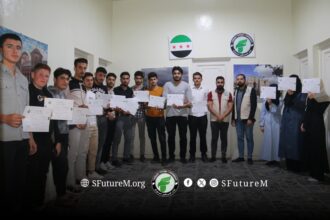Saudi Positions on Syria

In the context of the Syrian revolution, the Kingdom of Saudi Arabia supported the Syrian opposition by providing financial and military aid. This support included the training and arming of thousands of Syrian fighters in the Syrian opposition forces. The aim of this support was to help defeat the regime of President Bashar al-Assad and provide a balance against the increasing jihadist organizations in the country. In the early stages of the conflict, Saudi Arabia also supported moderate factions of the Free Syrian Army, such as the Syrian Revolutionary Front, which received financial backing from the Kingdom. Since then, circumstances have changed following the American withdrawal from supporting the opposition and their support for the Syrian Democratic Forces, and talks have been held between Saudi Arabia and the Syrian regime regarding diplomatic normalization. It is believed that Saudi Arabia seeks to play a leading role in removing Iranian influence in the region.
In the context of the Syrian revolution, Saudi Arabia has changed its stance on the revolution over time. Here are some key points:
- Early support: In the early stages of the conflict, Saudi Arabia supported moderate factions of the Free Syrian Army.
- Changing circumstances: As the conflict evolved and regional tensions escalated, the circumstances changed. In August 2017, the Saudi Foreign Minister informed the Syrian opposition that the Kingdom was withdrawing its support for them. Since then, Saudi Arabia has taken a more tolerant stance towards the Assad regime.
- Potential diplomatic normalization: In recent years, talks have been held between Saudi Arabia and the Syrian regime regarding diplomatic normalization.
In summary, Saudi Arabia’s position on the Syrian revolution has changed based on political and strategic developments in the region.
Therefore, the change in Saudi Arabia’s stance on the Syrian revolution can be attributed to several factors:
- Political and strategic developments: As the conflict in Syria evolved and regional tensions escalated, Saudi priorities changed. Potential diplomatic normalization with the Syrian government may play a role in changing the stance.
- Internal challenges that affect Saudi foreign policy decisions.
- Regional orientations and relationships: Saudi Arabia has relationships with other countries in the region, such as Russia, Iran, Turkey, and Israel, and these relationships may influence its stance on the Syrian revolution.
The change in Saudi Arabia’s stance on the Syrian revolution reflects an interaction with multiple developments in the region and the world.
The Kingdom of Saudi Arabia has announced the appointment of its first ambassador to Syria in over a decade. Ambassador Faisal bin Saud Al-Mujifal has been appointed as the ambassador to Syria nearly 12 years after Riyadh withdrew its ambassador from Damascus and severed diplomatic relations at the beginning of the Syrian revolution. This step is considered a significant development in the moves of Arab countries towards normalizing relations with the Syrian regime, which was previously warned by several Western and Arab countries after its suppression of popular protests against it in 2011.
It is difficult to definitively determine Saudi Arabia’s interest in relation to the Syrian revolution, as it depends on numerous political and strategic factors. Here are some points that could influence Saudi Arabia’s interest:
- Regional balance: Saudi Arabia seeks to maintain regional balance and influence in regional affairs. Its interest might be in supporting parties that it sees as supportive of its interests.
- Alliances and regional orientations: Saudi Arabia has relations with other countries in the region, such as Russia, Iran, Turkey, and Israel, and these relationships may affect its position on the Syrian revolution.
- Security threats: The conflict in Syria represents a security threat to the region in general. Saudi Arabia’s interest may be in reducing Iranian influence and extremism in Syria.
- Humanitarian crisis and refugees: Saudi Arabia is concerned with the humanitarian crisis in Syria and its impact on refugees. Its interest may be in working to alleviate the suffering of the Syrian people and thus on the host countries that have begun to grow weary of them.
Finally, Saudi Arabia’s position stems from a political reading of the regional and international reality, which means that Saudi Arabia does not enter alone against the direction of the region and the international community. However, the question remains whether Saudi Arabia can succumb to Russian and Iranian blackmail and normalize relations with Assad at the expense of the Syrian people, and whether it can sacrifice its interests with the Americans and the European Union who continue to impose sanctions on the Assad regime, or if Saudi Arabia is trying to play a new role in the region through the Syrian gateway.
Dr. Maha Deria
Independent Researchers
Syrian Future Movement (SFM)






